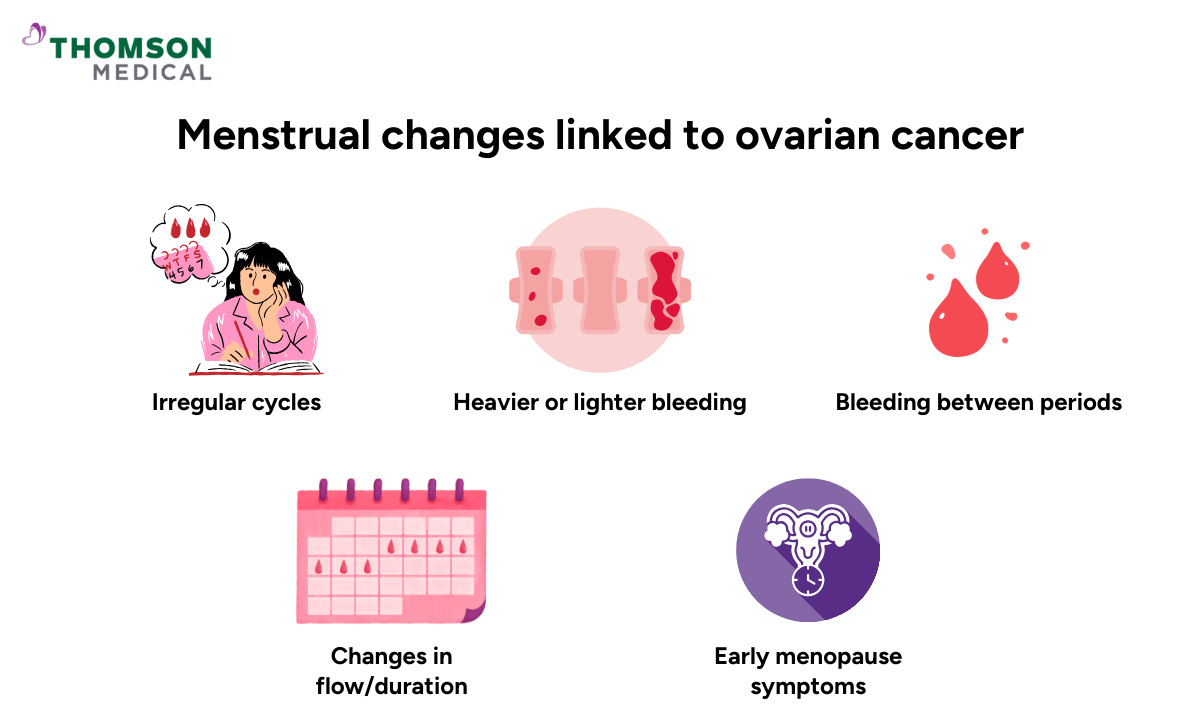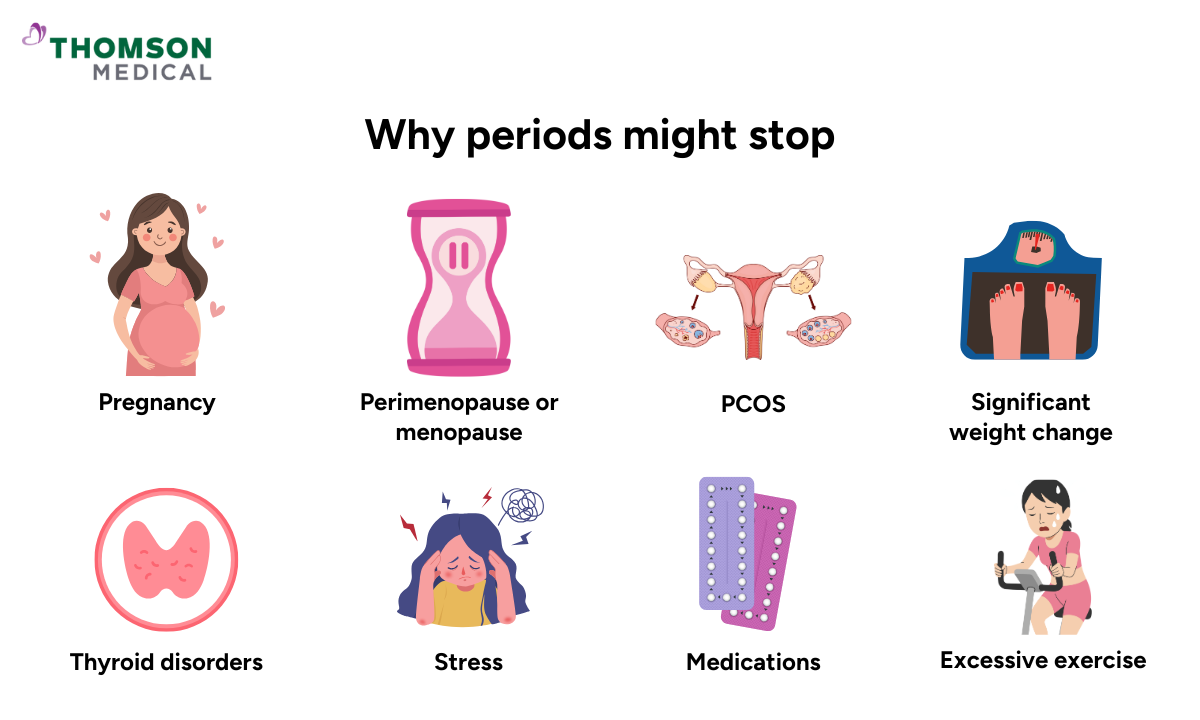It’s natural to worry if your period suddenly stops or becomes irregular. While common causes include stress, hormonal changes or menopause, some women wonder if it could be something more serious, such as ovarian cancer.
What is ovarian cancer?
Ovarian cancer occurs when abnormal cells in the ovaries grow uncontrollably and form a tumour. The ovaries produce eggs, as well as hormones such as oestrogen and progesterone, which regulate the menstrual cycle and fertility. Overall, there are three main types:
Epithelial ovarian cancer:
The most common form, starting from the ovary’s surface layer.
Germ cell tumours:
Developing from the cells that produce eggs.
Stromal tumours:
Arising from hormone-producing tissues.
Because the ovaries lie deep within the pelvis, early symptoms are often subtle. In some types of ovarian cancer, particularly hormone-producing stromal tumours or advanced disease, hormone levels may change, occasionally affecting menstruation.
Does ovarian cancer stop periods?
In some cases, ovarian cancer can affect your menstrual cycle. However, it’s important to know that this is not necessarily an early or common symptom. The ovaries control menstruation by releasing eggs and producing the hormones oestrogen and progesterone. When cancer develops in these organs, it can disrupt normal hormone levels, leading to changes such as:
Irregular or unpredictable periods
Lighter or heavier bleeding than usual
Missed periods (amenorrhoea)
Shorter or longer cycles
However, many other factors can cause similar changes such as pregnancy, polycystic ovary syndrome (PCOS), thyroid conditions, or lifestyle stress. A missed period alone is very unlikely to indicate ovarian cancer, especially in the absence of other symptoms.
In more advanced cases, or after treatments like surgery or chemotherapy, some women may stop having periods altogether. This can happen if both ovaries are removed, leading to a sudden drop in hormone levels and early menopause.
If your period stops unexpectedly or your cycle changes for several months, it’s best to speak with our gynaecologist. A simple assessment or scan can help rule out underlying issues and give you peace of mind.
Our oncology specialists
Loading...
Other menstrual changes linked to ovarian cancer

Although a missed period can sometimes occur, ovarian cancer is more likely to cause subtle changes to the menstrual cycle or hormones than to stop periods completely. As these symptoms resemble common hormonal fluctuations, many women may not notice them at first. Some possible menstrual changes include:
Irregular cycles:
Periods may become unpredictable, shorter, or longer than usual.
Heavier or lighter bleeding:
Some women experience unusually heavy periods, while others notice very light or spotty bleeding.
Bleeding between periods:
Unexpected spotting outside of your normal cycle may occur.
Changes in flow or duration:
Periods that are longer, shorter, or different in texture or colour than normal.
Early menopause symptoms:
Hot flushes, mood swings, or missed periods can appear if the ovaries are affected by cancer or its treatment.
Ovarian cancer can disrupt the production of the key reproductive hormones oestrogen and progesterone, which regulate your cycle. Abnormal fluctuations in these hormones can cause irregular bleeding or changes to your cycle.
Possible reasons that periods stop

If your period suddenly stops, it doesn't necessarily indicate a serious problem. There are many possible explanations, most of which are not related to ovarian cancer. Here are several common reasons that period might stop:
Pregnancy:
This is the most common reason for a missed period. A simple home pregnancy test can confirm this.
Perimenopause or menopause:
Hormone levels naturally fluctuate as women approach menopause, often causing irregular or missed periods.
Polycystic ovary syndrome:
PCOS is a hormonal imbalance that can cause irregular cycles, excess hair growth, and acne.
Thyroid disorders:
Both an underactive and overactive thyroid can affect hormone regulation and delay menstruation.
Stress:
Emotional or physical stress can temporarily suppress the hormones responsible for ovulation and menstruation.
Significant weight changes:
Rapid weight loss, eating disorders, or very low body fat can stop ovulation.
Excessive exercise:
Intense physical training, especially without enough nutrition, may lead to missed periods.
Certain medications or contraceptives:
Birth control pills, injections, or other hormonal treatments can sometimes stop or delay periods.
Most causes of missed periods can be treated once the underlying issue has been identified. If you’re unsure what the cause is, a doctor can perform simple tests, such as hormone checks or pelvic scans, to help determine it and restore balance to your cycle.
Other early signs and symptoms of ovarian cancer
Ovarian cancer is often referred to as a 'silent disease' because its initial symptoms can be vague or easily mistaken for common digestive or hormonal issues. Some common early symptoms include:
Persistent bloating or abdominal swelling:
Feeling unusually full or noticing your clothes becoming tighter around the waist.
Pelvic or lower abdominal pain:
A dull ache or pressure that doesn’t go away.
Changes in appetite:
Feeling full quickly or losing your appetite altogether.
Frequent urination:
Needing to urinate more often or urgently, without an infection.
Unexplained fatigue:
Ongoing tiredness not improved by rest.
Unexplained weight loss or gain:
Especially around the abdomen.
Changes in bowel habits:
Constipation, diarrhoea, or general digestive discomfort.
Menstrual irregularities:
Changes in bleeding pattern, missed periods, or spotting between cycles.
However, recognising these subtle changes early on can have a significant impact on receiving an accurate diagnosis and appropriate treatment:
When to seek medical advice?
It’s normal for your menstrual cycle to change slightly from time to time. However, you should speak with a doctor if your periods stop unexpectedly or your cycle becomes irregular for no apparent reason. Initially, you should see a gynaecologist if:
Your periods have stopped for more than three months, and you’re not pregnant or menopausal.
You experience persistent bloating, pelvic pain, or abdominal discomfort.
You feel full quickly or have a loss of appetite.
You notice changes in bowel or urinary habits that last more than a few weeks.
You have unexplained fatigue, weight changes, or abdominal swelling.
Your doctor may recommend:
A pelvic examination to check for abnormalities.
A transvaginal ultrasound to assess the ovaries and uterus.
A CA-125 blood test to measure a protein level that can be elevated in ovarian cancer.
Further imaging scans or diagnostic tests if necessary.
Remember, paying attention to changes in your body and seeking medical advice early on ensures the best possible care and peace of mind.
FAQ
What were your first ovarian cancer signs?
Most women notice vague symptoms: bloating, abdominal pain, feeling full quickly, frequent urination, fatigue, or changes in bowel habits are much more common than menstrual changes.
What are your periods like with ovarian cancer?
Periods can be unchanged, more irregular, heavier, lighter, or sometimes missed, but these changes are not typical for most women with ovarian cancer.
Can you still get your period if you have ovarian cancer?
Yes, most women with ovarian cancer continue to menstruate normally, particularly in the early stages. Ovarian cancer rarely disrupts your menstrual cycle, which is why regular periods don't rule out the disease. Periods would typically only stop if you've reached menopause, had your ovaries surgically removed, or if cancer treatment affects ovarian function. Ovarian cancer is usually detected through other symptoms like persistent bloating, pelvic pain, or changes in eating and urinary habits – not through menstrual changes.
How do menopause and ovarian cancer bleeding differ?
Menopause often causes skipped periods and can result in spotting or irregular bleeding. Ovarian cancer bleeding may include unusual spotting between periods, postmenopausal bleeding, or heavier flow, but persistent pelvic symptoms and abnormal bleeding should be checked by a doctor.
How can I tell if my missed period is due to ovarian cancer or something else?
Missed periods are usually caused by stress, hormones, PCOS, pregnancy, or menopause, and therefore ovarian cancer is a rare cause. If you also have persistent symptoms like abdominal pain or bloating, you should start seeking medical advice.
How to confirm if you have ovarian cancer?
To diagnose ovarian cancer, your doctor will start with a pelvic examination to feel for any lumps or abnormalities. Further tests may include an ultrasound of your ovaries and abdomen, blood tests to check for markers like CA-125, and imaging scans such as CT or MRI to look for signs of cancer and its spread. In some cases, a biopsy – removing a small tissue sample for laboratory analysis – may be needed to make a definite diagnosis. Your doctor will choose the best combination of tests to accurately confirm ovarian cancer and plan your treatment.
The information provided is intended for general guidance only and should not be considered medical advice. For personalised recommendations and tailored advice based on your unique situations, please consult a specialist at Thomson Medical. Request an appointment with Thomson Medical today.
For more information, contact us:
Thomson Specialists (Women's Health)
Thomson Women's Clinic (TWC)
- Novena:
6592 6686 (Call), 8611 8986 (WA) - Bukit Batok:
6569 0668 (Call), 8686 3525 (WA) - Choa Chu Kang:
6893 1227 (Call), 8282 1796 (WA) Jurong:
6262 8588 (Call), 6262 8588 (WA)- Katong (female doctor):
6970 2272 (Call), 8611 9020 (WA) - Punggol:
6243 6843 (Call), 8811 0328 (WA) - Sembawang: 6753 5228
- Sengkang: 6388 8125
- Serangoon (female doctor): 6382 3313
- Tampines: 6857 6266
- Tiong Bahru: 6276 1525
